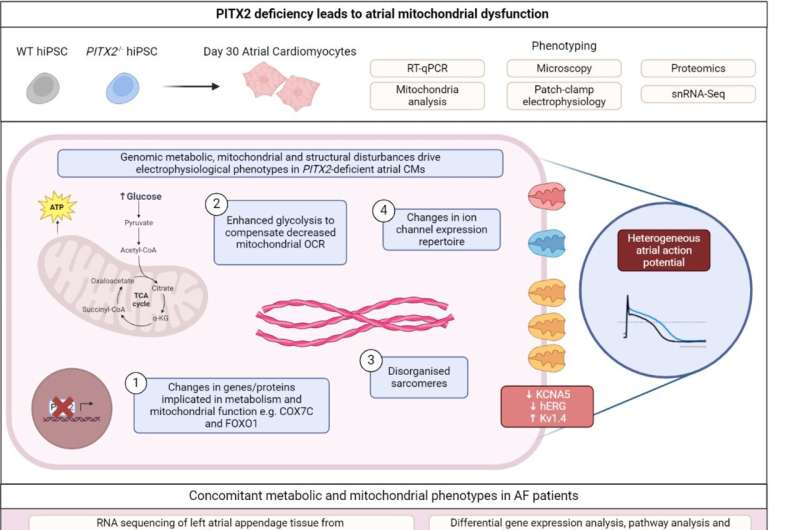This article has been reviewed according to Science X's editorial process and policies. Editors have highlighted the following attributes while ensuring the content's credibility:
fact-checked
peer-reviewed publication
trusted source
proofread
Gene-related metabolic dysfunction may be driving heart arrhythmia

Patients with a common heart arrhythmia called atrial fibrillation could benefit from future treatments that target inefficiencies in heart cell metabolism, a new paper has found.
A study published in Cardiovascular Research Journal discovered that a gene deficiency found in patients with atrial fibrillation may be leading to reduced energy production in heart cells. Deficiencies in the PITX2 gene in heart cells leads to some mitochondria, which are parts of the cell that produce energy, being smaller and less efficient.
The team led by researchers from the Institute of Cardiovascular Sciences at the University of Birmingham and from University Medical Center Hamburg-Eppendorf in Germany studied lab-grown PITX2-deficient cardiac cells and compared to normal cardiac cells to study the effect of PITX2 on cell development and function.
Key findings include:
- Cell structure and function: The PITX2-deficient heart cells are shorter and more disorganized, with more cells having single nuclei. These cells also have smaller mitochondria and changes in the proteins involved in energy production.
- Energy production: The mitochondria in PITX2-deficient cells are less efficient at producing energy through their usual processes and instead rely more on glycolysis (a less efficient way of generating energy). This shift is linked to increased spontaneous beating rates and irregularities in the heart cells' electrical activity. Impaired mitochondrial function with reduced ATP/energy production is an important factor in heart failure.
- Gene expression: Analysis of the genes in these cells reveals significant differences in those involved in energy production and ion channel function (which are crucial for maintaining the heart's rhythm). Similar changes are observed in the heart tissue of patients with AF compared to those with normal heart rhythms.
Professor Larissa Fabritz, Chair of Inherited Cardiac Conditions, University Center of Cardiovascular Science and Honorary Chair, Institute of Cardiovascular Sciences, University of Birmingham said, "This study shows how a specific gene affects the heart's ability to produce energy and maintain a regular rhythm, providing new insights into potential treatments for atrial fibrillation.
"We observed that the deficiencies in the PITX2 gene leads to heart cells not functioning properly, including having a smaller and less efficient system for producing energy. This means that those heart cells are having to increasingly rely on glycolysis to produce energy which introduces oxygen stress into the mix.
"Normal cardiac metabolism uses free fatty acids as the primary energy source in resting conditions. It burns glucose when exerted as glucose metabolism is not dependent on oxygen, as opposed to fatty acid oxidation. In PITX2 deficiency, there is reduced mitochondrial respiration, pushing the heart cells into an oxygen-deficient stress state that uses glucose for energy. This shift is linked to increased spontaneous beating rates and irregularities in the heart cells' electrical activity."
The findings could lead to new potential treatments for atrial fibrillation that target improving energy production in heart cells, particularly in those with PITX2-related deficiencies.
More information: Jasmeet S Reyat et al, PITX2 deficiency leads to atrial mitochondrial dysfunction, Cardiovascular Research (2024). DOI: 10.1093/cvr/cvae169


















